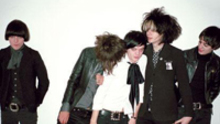In about mid-February, I opened up the letters page of Rock Sound magazine and had all my worst expectations utterly confirmed - three pages of what was otherwise a reasonable attempt at rock journalism had been set aside for people to childishly dictate what others should think. It was nothing but "This band rule" and "how dare x say y about z - she doesn't know what she's talking about", and the combined effect of this was nearly enough for me to put down my pen and never write again.
Sadly for you, I changed my mind. But it did make me think once more about why people bother telling each other about their opinions. In a basic sense, the simple fact that one person thinks one thing is unlikely to have any effect on the conflicting opinion of any other person. What is more, when the sole thing that we are talking about is music - whose only real effect will be personal enrichment - the situation becomes even more ridiculous. Do people really think that by repeatedly presenting their own assertions, with no attempt to justify them beyond petty insults, they are going to change other people's minds?
What worries me even more than this, however, is the fact that I can recognise my own guilt in this respect. Looking at the matter with a cool detachment, everybody will agree (for example) that those who take offence if somebody doesn't like their favourite band are behaving ridiculously, yet, to a greater or lesser extent, we all do it. I like to think that my musical taste is supremely personal, but if somebody came up to me right now and told me that they found my favourite band boring, then whether or not I actually chose to express my opinion, I would not be able to avoid being partially offended.
So there seem to be conflicting forces at work here. On the one hand, there is the force of logic, telling us that it does not matter what other people think, and that when we are dealing purely with opinions, it is impossible for one assertion to rule another one out. On the other hand, there is the irrational yet far stronger force of instinct, which somehow makes us tingle when we here this song, or shed tears when that chorus is played, or refuse to stay in one place when that riff comes thundering in, yet which will never allow for a logical explanation or justification of why the music makes us feel like we do. That is why, I suppose, those fans of Limp Bizkit feel that they have to shout about it just as, if we're honest, I did about Silver Ginger 5 in the very first of these ramblings. We could conclude here that it is an entirely natural thing to entertain an irrational love for something, and to feel the urge to declare that love to the world. The only thing that we must learn to control is the way in which our feelings are expressed - it is wrong to express our love of one thing in terms of hate of another.
I can't help but feel, though, that leaving the matter here would not do justice to the intricacies of the whole affair. After all, I am not merely seeking the answer to the question "Is it right to do this?", which could always result in the entirely unsatisfactory response that everybody has their own opinion, and that there can never be one conclusive answer. Rather, I am seeking to find out "Why do I do this?" Despite my obsession with logical analysis, and the rather depressing conclusions that this has led me to (including, on a general level, that life is futile), I still carry on. I still have an urge to live, and to present my life in writing, even though I know that it is futile. As I said back in December, this series of 'Mediocrity in Music Rejected' pieces can be seen either as the presentation of my ideas for others to sample, or simply as a chance for me to lay out my muddled thoughts and work out for myself what they all mean. It is not enough to say that I think what I think and that it concerns nobody else, because the level of understanding that I crave is far higher than that.
The way in which we can sample bits of other people's lives and attitudes in order to reach a higher level of understanding is probably best displayed by an extra-musical example. Recently, I re-watched the 'Chronicles of Narnia' television series which were shown by the BBC in the 1980s. As an obsessive fan of fantastical worlds such as Oz, I was greatly affected by the depiction of the land of Narnia, and in particular by those characters who display an incurable devotion to Aslan, the Narnian equivalent of God. Even though this was only a children's series, and the original books were written for children, the scene of 'The Silver Chair' in which Prince Rillian is freed from his enchantment, and Puddleglum gives a moving speech in support of Narnia, is one of the best in the history of television and literature. Scenes such as this (which has its equivalents in the other Narnia books/series) had such an effect on me that I was almost able to understand the Christian faith (for which the tales of Narnia are an allegory) in a way which no sermon had ever achieved. By expressing Christian values in an entirely new way, hence encouraging me to approach them in a new way, Narnia enabled me to appreciate something which had previously held no value for me whatsoever. Therefore, I propose that by presenting our ideas on paper, for all to see, we can encourage others to look at life in a new way, and perhaps to understand and appreciate it on a new, useful and exciting level.
These days, artists that do a similar thing with music, by pushing boundaries and challenging their listeners, are difficult to find. The first band that really did this for me, I suppose, must have been The Wildhearts, when they signed to Mushroom Records in 1997. The Wildhearts were my first musical love, and, because it was this group that made me discover rock music, formulate my likes and my dislikes, and find my place in the rock'n'roll world, they formed the key-note of my life's soundtrack. Everything which came afterwards, whether better or worse, similar or completely different in approach or style, had to be compared with the band that first made it real for me. As such, the total change of direction that the band took when they signed to Mushroom Records provided me with a real challenge, as there was no longer a safe, ideé fixe for me to turn back to if I didn't like what other bands were producing - I was so used to knowing that I would like whatever they put out (because, even though the earlier part of their career saw a huge variety of techniques at play, it was still essentially the same type of music) that my first glimpse of their 'new' sound, in the form of a promo-only cover of Elvis Costello's 'Pump It Up', completely threw me off track. When I first heard their rendition of the song, my brain was unable to make any sense of it - there was no melody, it appeared that all the individual sounds had been screwed up and mashed together in the mix, and the ears had nothing to focus on, as the incomprehensible vocals seemed to be acting more as a fifth instrument than as anything else. In short, there was no 'trademark' element that I could cling to and work my way around, and if the song had been recorded by anybody else, I would probably have given up on it there and then. Because I loved the band, however, and because I wanted (possibly even needed) to love everything that they had ever done, as I had done up until that point, I persisted. I think I must have re-played the song about thirty times in a row that day. I played it until I hated it more than I had done at first, I was so sick of it. But gradually, over those thirty re-plays, my brain must have become accustomed to the sound - because there was no melody, it focussed on the rhythms. The bass and drums were more important than they had ever been before, and somehow even the voice was part of the rhythm section! As I became attuned to the distorted mix, I was gradually able to distinguish between the sounds, until the song sounded like any other, except better, because it was operating on a different level. When I was so sick of the song that I could listen to it no more, I put it away and went to sleep. The next day, I played it again and was simply blown away by the beauty of the recording. It amazed me that a simple little pop/rock band (important as they were) were actually changing the way that I listened to things. Since then, of course, my taste has developed and I am able to see any new and confusing sound as an enjoyable challenge. But it is quite possible that without the help of The Wildhearts, I would have remained with one bland, unchanging soundtrack for my whole life, and been all the more boring because of it.
Every now and then, a band or musician confronts me in a similar way. Grand Theft Audio, the band that I thought it would be safe to listen to because it featured members of 3 Colours Red, RealTV and The Wildhearts (all of whose music I knew to be "my sort of thing"), managed to trick me into liking that dreadful Americanised rapping which is used so excessively by the so-called 'Nu-metal' acts. Who knows, I may even buy a Linkin Park album.
Equally, when I got hold of ex-Beekeepers singer Jamie East's new solo material on www.jamieeast.com, I turned the stereo up, expecting something punky and poppy, and was already singing along before I realised that this was commercial!, and had a dance backing! and all the other criteria of things that I hate. I was expecting so much to like it, that I had forgotten to pretend that I didn't.
It strikes me at this point that we can 'condition' ourselves to like anything, if we really try. It's a familiar cliché that life would be incredibly boring if we all had the same opinions and liked the same things, but just as clichés are often entirely true, equally it is very easy to forget their sentiments when the fashionable, monetary and other concerns of the current musical business get in the way of what is always, always has been and will always, as long as there is anything natural left in this disgustingly fucked-up, cynical and vulgar world which we call 'civilisation', be the most important force of all.
















